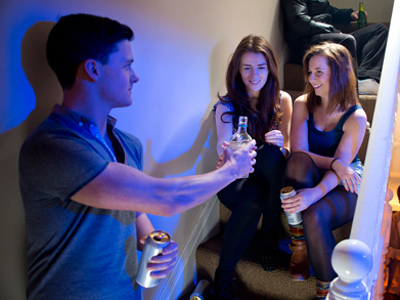How can I Protect my Child from Drugs and Substance Abuse?
Addiction is a disease which you can protect your child from. Parents have a huge influence on children’s behaviour. Just make sure that you set a good example and communicate well with your child. Talk about the risks and don’t be afraid to seek help

Parents often worry about their children falling into the trap of drug or substance abuse. The good news is that parents wield significant influence in preventing this. This guide aims to help you educate your child about the dangers of substance abuse, recognize signs of drug misuse, and find the necessary support if the issue arises.
Commonly Abused Substances
When we think of drug or substance abuse, we often picture hard drugs like heroin or cocaine. However, everyday items from the medicine cabinet are more frequently misused. While illegal drugs are a concern, don't forget to secure access to medicines at home. Here's a list of frequently abused substances:
- Alcohol
- Tobacco
- Over-the-counter medicines
- Prescription medicines
- Solvents (e.g., paint thinner or glue)
- Fuel (inhaling petrol and lighter fluid fumes)
- Cannabis (weed or hashish)
- Stimulants (amphetamine or cocaine)
- Party drugs (ecstasy or ketamine)
- Hallucinogens (LSD, magic mushrooms)
Many of these substances are readily available, even within your own home. Be sure to keep them out of reach of your children.
LEARN ABOUT THE BENEFITS OF LEARNING THROUGH QUIZZES
Causes of Substance Abuse
People misuse drugs and substances for various reasons. Among children, curiosity, experimentation, and peer pressure are primary drivers. Most youngsters may try drugs, but only a few become regular users. Those who do often use drugs to escape from other life problems. Here are major risk factors for substance addiction:
- Stress - Using drugs to cope with life's stresses can provide short-term relief but worsen the situation in the long run.
- Mental illness - Substance abuse is often linked to mental health issues. People suffering from anxiety or depression may self-medicate with drugs or alcohol, which can worsen their mental health.
- Family history - Children from families with a history of substance abuse are more vulnerable, whether due to genetics or the environment.
Parental Influence on Children
Parents play a significant role in shaping their children's attitudes towards drugs. Your behaviour sets the example your child will follow. To be a good role model:
- Avoid smoking - If you want your child to be a non-smoker, quit or reduce your smoking and communicate the risks.
- Drink responsibly - Limit alcohol consumption in front of your children to one or two glasses.
- Manage stress - Don't turn to alcohol as a coping mechanism. Find healthier ways to handle stress.
- Point out irresponsible behaviour - Discuss negative portrayals of substance abuse in media and never glorify your own experiences with drugs or alcohol.
Actions speak louder than words, so be mindful of your behaviour around your children.
Talking to Your Child About Substance Abuse
Effective communication with your child is crucial. Establish trust and keep the lines of communication open by discussing daily events, both at school and with friends. Ask open-ended questions to encourage conversation. For example, ask "What was the best thing that happened today?" instead of "Did you enjoy school today?"
While children may not encounter drugs until secondary school, it's essential to talk to younger children about substance abuse. Primary school age is the best time to educate them about the dangers. Discuss topics like:
- The harmful effects of tobacco, alcohol, and drugs
- The legal status of tobacco, alcohol, and drugs
- Your stance on substance abuse
- Instances when you refused tobacco, alcohol, or drugs
- Ways to say no to tobacco, alcohol, or drugs
Listen without judgment, address their concerns calmly, and share facts to dispel any misconceptions. Children whose parents discuss substance abuse are less likely to use drugs.
FIND OUT WHY KIDS LOVE OUR WEBSITE
Being Involved in Your Child's Life
Older children and teenagers seek independence, making it challenging to stay engaged in their private lives. However, maintaining involvement is essential, as children with loving and interested parents are less likely to fall into substance abuse. Here are some tips:
- Attend events - Support your child's activities, attend their events, and praise their efforts.
- Allocate family time - Create opportunities for family bonding and communication, whether during meals or leisure activities.
- Offer emotional support - Be there for your child when they need to talk or express their feelings.
- Get to know their friends - Welcome your child's friends into your home to monitor their social circle and discourage negative influences.
Recognizing Signs of Substance Abuse
Despite your efforts, your child may experiment with drugs. It's crucial to detect this early. Watch out for signs and symptoms, including:
- Decline in school performance
- Changes in behaviour, increased secrecy, aggressiveness, or a sudden need for money
- Neglect of appearance and personal hygiene
- Deterioration in health, such as disrupted sleep, low energy, poor concentration, and paranoia
The specific symptoms depend on the substance abused. If you notice concerning signs, talk to your child and consult your GP.
Dealing with Substance Abuse
Discovering that your child is abusing drugs or alcohol is a challenging situation. However, it's essential not to panic. Here are steps to take:

- Stay calm - Avoid showing anger or judgment. Patience and understanding can help your child open up.
- Listen - Encourage your child to talk, and pay attention to their reasons for substance use.
- Provide support - Help your child give up their habit and boost their confidence to quit for good.
- Seek help - If the issue is severe, consult your GP for advice or potential treatment options.
Your child's doctor can explain the risks of substance abuse and recommend treatment, including counselling or rehabilitation if necessary.
Addiction is a disease, not a moral failing, and parents have a significant impact on their children's behaviour. Be a good role model, maintain open communication, and seek help when needed.
For further information, explore our Knowledge Bank for answers to parents' questions. We offer guidance on various parenting issues and educational resources. Discover more today!



